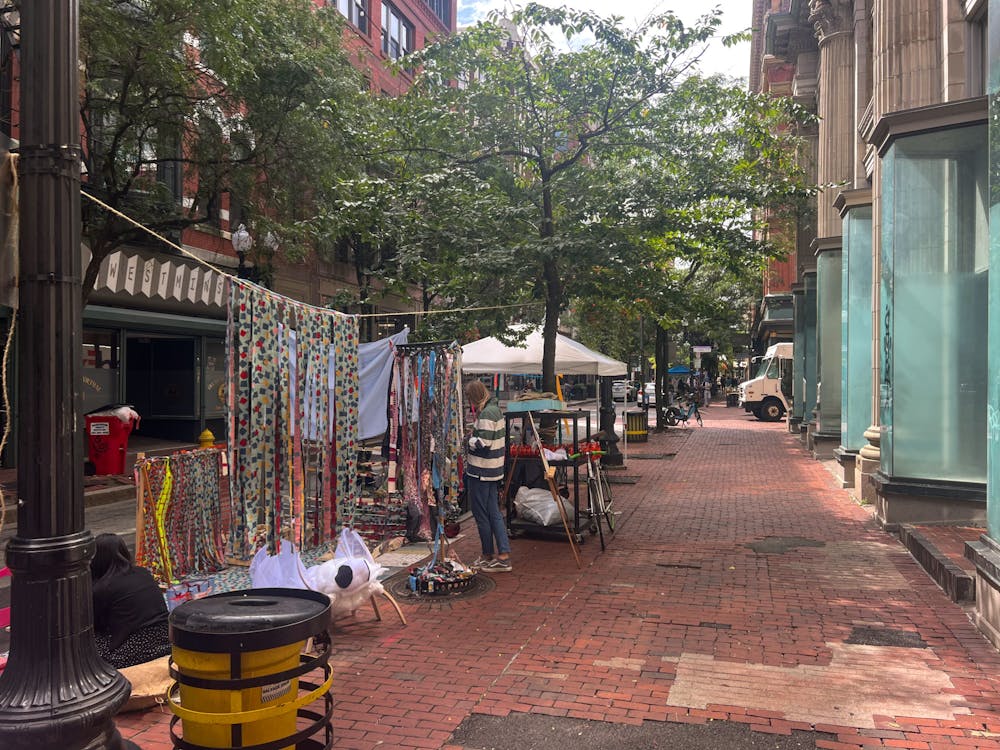Westminster and the surrounding streets were transformed into a walkable festival last Friday as local organizations and Providence residents filled parking spaces downtown to participate in Park(ing) Day, an annual event where curbside parking spaces are repurposed for public enjoyment.
Park(ing) Day was founded in 2005 by Rebar, a former San Francisco-based design studio, and has since expanded around the world, with 166 participating locations in 2022. The event first came to Providence in 2013.
According to the event’s website, Rebar’s founders first rented a parking space in San Francisco to show how streets can be used beyond vehicle movement and storage. The following year, in partnership with the Trust for Public Land, the group launched Park(ing) Day as an annual event “for people to reclaim urban space from cars, one parking space at a time.”
This year, The Avenue Concept — a public art nonprofit — took over a parking space on Westminster Street and set up a booth where they handed out stickers and pamphlets. A chalkboard next to the booth invited passersby to “draw or write with chalk what they believe public art is, in English and Spanish,” said Jan Carlos, community participation manager at The Avenue Concept.
Carlos said he hoped that the event helped spread awareness about the ways in which parking spaces can be repurposed for public use and community engagement.
“It definitely makes people walk around a little bit more and sort of more open to talk to each other,” they said, “instead of everybody with their heads in their phones.”
“It is critically important to me that through landscape architecture, people are given continuous opportunities to connect with each other … the spaces around them and … the natural environment,” wrote Kurt Van Dexter, the Providence event’s co-founder and president of the Rhode Island chapter of the American Society of Landscape Architects, in an email to The Herald.
Van Dexter originally organized the event with the then-president of RIASLA, Jenn Judge, and the then-president-elect of Rhode Island’s American Institute of Architects Vada Seccareccia.
Park(ing) Day PVD is sponsored by the Rhode Island Street Transformation Project Mini Grant — through Providence Streets Coalition and Grow Smart R.I. — and is organized by the Rhode Island chapter of the American Planning Association and RIASLA.
This year’s participating organizations included local nonprofits, collectives, coalitions and individuals like Rhode Island School of Design students — all united by a desire to reimagine public space in Providence.
Liza Burkin, the lead organizer and founder of Providence Streets Coalition, said that she hopes attendees learn how “our public land and space can be used in different ways that support human creativity and vibrancy and just being, rather than a place to temporarily store our cars.”
Burkin has participated in the event for nearly a decade, adding that this is the biggest Park(ing) Day PVD she has seen. The project fizzled out about five years ago, Van Dexter wrote, but Burkin told The Herald that it has been brought back gradually since 2021.
One parking space, or “parklet,” designed by RISD Interior Architecture master’s students utilized reused fabrics and construction materials to create a vision of a “softer” city that is not dominated by heavy machinery like automobiles.
Shivani Pinapotu, one of the RISD students who set up the installation, said that the goal is to introduce an element of play into public space.
“Streets can be fun — cities can be fun and playful and whimsical,” Pinapotu said. “We forget that often.”
Burkin noted the symbolic nature of hosting Park(ing) Day on Westminster Street, which was closed off to traffic in the 1960s and transformed into a pedestrian mall, the first of its kind in New England. The street was reopened to vehicle traffic in 1986.
“All of this is about making change and building streets for people,” Burkin said.
Correction: A previous version of this story misspelled Liza Burkin's last name. The Herald regrets the error.





